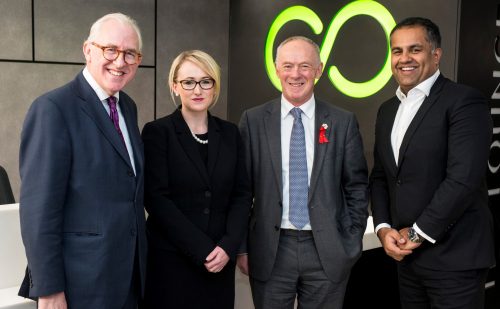Labour seeking ‘collaboration’ with business

A Labour government would collaborate with business and focus on the advancement of technology to drive the so-called fourth industrial revolution, Shadow Business Secretary Rebecca Long-Bailey told a gathering of senior business leaders in Manchester.
Speaking in front of an invited audience at the launch by national law firm Shoosmiths of a series of ‘In Conversation With…’ events at their recently-opened offices in the XYZ Building in Manchester, the MP for Eccles and Salford outlined Labour’s industrial strategy.
Long-Bailey, Shadow Secretary of State for Business, Energy and Industrial Strategy, said there needed to be increased investment in R&D and equivalent spending per head of population on transport infrastructure for the North as that in the South East.
She added that a Labour government would link the major northern cities of Manchester, Liverpool, Leeds and Sheffield with significant investment.
She also touched on an aspiration for 60% of the UK’s energy to come from low carbon or renewable sources by 2030.
Long-Bailey said a Labour government would focus on supporting digital, physical and biological technologies, seeking collaboration with business in a transparent environment.
The event, which was held in the wake of the publication of the Government’s Industrial Strategy, was co-chaired by Shoosmiths’ head of office Vaqas Farooq and Hamish Sandison, chair of Labour Business, the business membership group affiliated to the Labour Party.
Manchester City Council leader Sir Richard Leese was among those who addressed the audience and welcomed Long Bailey’s engagement with Manchester business, citing the long-standing and successful local relationship between the Labour-controlled city council and business.
Shoosmiths Partner Farooq stressed that Shoosmiths is politically impartial and would be inviting representatives of other political parties to speak at their events. He also alluded to his guest’s themes when he cited the transformation of the company’s productivity by its focus on innovation and employee wellbeing.
Ahead of Long-Bailey’s address, he said: “We’ve been innovative in what we’ve done at Shoosmiths with our people. We have focused on wellbeing and as direct result we achieved higher productivity, the two can go hand in hand something progressive companies are increasingly embracing.”
Applauding Shoosmiths for enabling its clients to engage more fully in the political process, Labour Business chair Sandison said: “I’m sure you will want to invite other political parties to address events like this in the future, so that your guests can compare their policies.
“But I hope that tonight’s event left them in no doubt whatsoever that Labour is deadly serious about listening to the business community, and developing policies for the next General Election that are unashamedly pro-business.”
Shoosmiths is a national law firm with 12 offices across the United Kingdom, more than 160 partners and more than 1,500 lawyers and support staff. The firm announced a turnover of £116.7m to end April 2017.
When questioned on nationalisation, Long-Bailey told the audience: “One of the things that upsets me the most is that I think certain parts of the media have developed this narrative that the Labour Party is going to nationalise everything, the state will run everything and it will be like the 1970s. And on the other hand, it is said that it’s the Conservatives who are the party of business, the true champions of the free market.”
She went on: “What we’re trying to do is redefine what people think of what the Labour Party stands for in business. What I would say is that we stand for collaboration.
“Because it’s not about picking an ideological approach saying the state does everything, or business does everything, because we know that doesn’t work.
“We know that we can only develop an economy that’s truly fruitful by business and industry working together with Government.”
However, she continued to say that didn’t mean to say that there weren’t certain elements of the economy that the Labour Party thought have been exploited, citing the water industry as an example, but exonerating North West-headquartered United Utilities, which she said had invested heavily in infrastructure and services.
She said: “There are other companies who don’t have such a great record. We know that there is up to £18bn paid to shareholders in the water industry every year and there hasn’t been the investment in infrastructure that we need to see to make sure that our water services are kept fit for purpose.
“The Government has a role to see where things aren’t working – and the water industry is not a competitive industry, it’s a monopoly and it hasn’t been working very well for the last few years and in many areas since it was privatised.”







